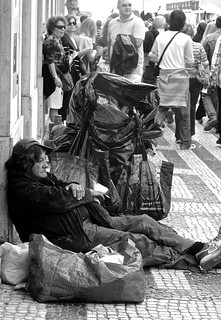| Back OpEd News | |||||||
|
Original Content at https://www.opednews.com/articles/Fixing-Homelessness-in-Ame-by-Marcus-Oakes-Homelessness_Housing_Salt-Lake-City-150217-416.html (Note: You can view every article as one long page if you sign up as an Advocate Member, or higher). |
|||||||
February 17, 2015
Fixing Homelessness in America
By Marcus Oakes
Homelessness has been in America for centuries. One city has made a HUGE leap in ending their chronic homelessness by putting people in housing, saving them time and money and actually helping those in need to get back on their feet.
::::::::
Homelessness has been an issue in America since the 1640s. Back then it was believed that if you were a good Christian, under God's grace, you would have everything you needed; thus, you would not be homeless. Although that is not the stigma that comes along with homelessness now, the homeless face other types of scrutiny.
Many cities throughout the United States have essentially made it illegal to be homeless. This puts the homeless in jail, then back on the street, making it hard to get a job due to a criminal record, therefore remaining homeless, and getting thrown in jail again.
This vicious cycle benefits no one and harms everyone.
No Food for You
Not only is it illegal to be homeless in some cities, but in others it is illegal to feed the homeless. Recently in Fort Lauderdale, FL, a 90-year-old WWII veteran was arrested twice in one week for feeding the homeless due to a new law criminalizing the act of food-sharing. Understandably this effort is geared toward helping the homeless to not be dependent on others for living but to find stable ground themselves and get off of the street. Dr. McLaughlin from the University of New England says that the longer homeless people are receiving help by social services, etc., "the less likely they are to get motivated and look for work."
But in America, Home of the Brave and Land of the Free Handouts, why take away food from those who need it most? When people are hungry, they often turn to crime. Just ask Aladdin: "Gotta eat to live, gotta steal to eat." Lucky for these poor souls, they at least get fed in jail.
The Price is Wrong
When you think of the homeless community, typically you think about poverty. But what you probably don't think about is how much money it is costing the city, and ultimately costing you.
Recently Salt Lake City, UT has been working on a different approach to end homelessness. The director of the Utah Homeless Task Force, Lloyd Pendleton, says that in Salt Lake they spend "about $20,000 per person, per year, on the street, because of [a chronic use of] emergency services." Money is spent on making arrests, putting people up in prison, feeding them in prison, and putting them back on the street. The big problem here is that this is not a solution, it's a Band-Aid.
The Price is Much Better
Even though feeding the homeless shouldn't be illegal, it isn't the answer either. These people need homes. They need help getting off of drugs and get jobs. Food is important, but it's only the start. It takes great community leadership to be able to help these people. Dedication and forward-thinking are key to successfully changing the community for the better. That's what Mr. Pendleton and his team have done for these people in Utah.
Pendleton continues by saying when they realized how much it cost to keep these people on the street, they realized that there must be a more humane and economic way to help them. Their solution? Put these people in housing. As crazy as it sounds to put homeless people into homes, instead of $20,000 a year, it only cost $7,800 a year per person to house them and give them social services. This "housing first" model does require drug and alcohol abstinence and provides such services. But this might be a hindrance to some people considering the program, but this tactic is killing two birds with a much cheaper stone.
Let's End Homelessness Everywhere
Not only is this a cheaper approach, but Salt Lake's chronic homelessness has decreased by 72% in the last decade. This model needs to be followed by every state. A group in Madison, WI has their own version in which they built mini houses for the homeless. Another approach by Geoffrey Canada in Harlem, NY is providing children with programs to help them have the means to stay off of the streets as adults.
The homeless can make it off of the streets, but they might need a boost. Many of them want off of the street, want jobs, want a home; Salt Lake City has found a way to fix this problem. It's time for others to follow.
Authors Bio:
Marcus Oakes is a Boise, Idaho native. He is currently studying forensic psychology through the University of North Dakota. He is a huge sports fan and will show you why you are wrong if you try and debate with him about anything sports related.
